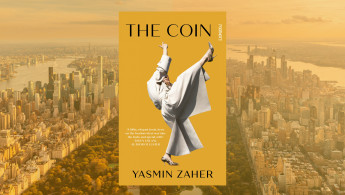Yasmin Zaher’s The Coin: Unintentionally shaking stereotypes of Palestinian women
Yasmin Zaher is not her protagonist. Although the main character in her debut novel, The Coin, might draw from Yasmin’s own experiences, she is, in Yasmin’s own words, “really f**ked up – try being in her mind for six years.”
This provocative debut follows a young Palestinian woman in New York, teaching at a school for underprivileged boys.
Her methods are unconventional (and unprofessional,) the novel follows as she descends into increasingly obsessive and impulsive situations, swindling Birkin bags or spending hours on a meticulous personal hygiene regime.
“Once I heard her, I had to write her down. Her voice came through quite abruptly and powerfully,” Yasmin remembers.
“She isn’t me, but she's fractals of my world put together. With fiction, we’re picking molecules from all over to make these hybrid characters,” the now Paris-based author says.
“Her memories of her grandmother’s garden and memories of nature are mine,” Yasmin adds.
“I love the nature in Palestine. When I wrote The Coin, I was living in New York, so I think I had a lot of nostalgia for the landscape. Landscape is an innocent thing, it’s not politicised. I almost see it as pureness.”
While not a reflection of Yasmin’s adulthood, The Coin deftly explores Yasmin’s own “flirtations” with some issues, including dualities of good and evil, clean and dirty, moral and immoral.
Having started writing the book in 2016 in New York, just after Trump’s election, Yasmin was surrounded by narratives of good and bad.
“Especially in New York, you were either a Trump supporter or an enlightened liberal. I was probably subconsciously fed up with that climate, especially when it seeps into literature. It makes literature very flat. I tried to evade and blur dichotomies in this book,” she said.
Instead, Yasmin played with autonomy, placing our lead outside of Palestine.
“It was very liberating because I didn’t have to write Palestine. This character relishes her freedom. She has no family, no friends, no husband… she’s really free. And she has a lot of money," Yasmin tells The New Arab.
"I enjoyed that she could do whatever she wanted because nothing was holding her down. In a way, it was one of her limitations – she was so uninhibited that she wasn’t grounded, she was a little bit crazy. I tried to blur the fact that she’s Palestinian,” Yasmin adds.
“She's not like what you expect her to be.”
It’s a refreshing addition to the canon of modern Middle Eastern literature, which often portrays women as having no agency.
“We’re portrayed as weak, but we’re savage really,” Yasmin laughs.
Shaking Palestinian stereotypes or commenting on political and humanitarian crises was not Yasmin’s driving force when writing The Coin, but it’s a thread that can’t be unpicked.
“With fiction, you get to a different kind of truth. It’s not the facts, it’s the depths of things, the soft core. I try not to write with an ideology. I’m interested in clothes, so I wrote about that.”
As a Palestinian author, I wonder if it’s frustrating to have every conversation turn to the ongoing crisis in Gaza.
“I’d rather be asked than not asked,” she answers. “That would be weird. If you want to support Palestine, my book is probably not a good way to do it, it’s not what people expect. But if reading my book is going to make you realise that we’re not all this image of what people think we are, then maybe that would help.”
In fact, Yasmin says that the best part of her experience as a debut author has been hearing from Palestinian readers.
“If I’ve been able to give them a little bit of pleasure or understanding, it feels like I’m doing something for my people. That’s not what I had in mind when writing this book, but that’s the whole experience of being Palestinian. It's a responsibility that you carry with you.
"It’s not a burden, but a privilege. I'm very proud to be Palestinian, it's an honour to belong to these people.”
What’s next?
Yasmin’s next book hits closer to home, following a group of Palestinian citizens of Israel – the author herself was born in Jerusalem.
“You're living in the heart of the hatred,” she says, speaking of friends and family in the area who are struggling, her own personal act of resistance.
“Every person contributes in the way that they can,” she adds, “even if it's not what is expected of you. With art, nobody’s ever waiting for you or expecting you to do something, so you have to create your own little territory of what you're about.”
Yasmin’s territory is one we should all want to be part of.
Isabella Silvers is a multi-award-winning editor and journalist, having written for Cosmopolitan, Women's Health, Refinery 29 and more. She also writes a weekly newsletter on mixed-race identity, titled Mixed Messages
Follow her on Twitter: @izzymks






 Follow the Middle East's top stories in English at The New Arab on Google News
Follow the Middle East's top stories in English at The New Arab on Google News


